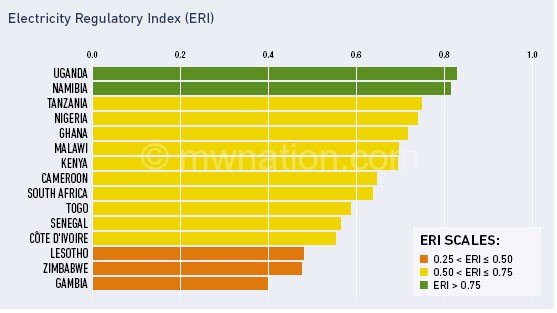
The African Development Bank (AfDB) has faulted Malawi’s electricity sector for lacking adequate level of capacity and appropriate mechanisms to allow the sector carry out its mandates.
This has been spelt out in the AfDB’s sponsored Electricity Regulatory Index for Africa (ERI) report, which measures the level of development of regulatory frameworks in 15 African countries, including Malawi, and examines their impact on the performance of their respective electricity sectors.
While observing that there are relatively robust institutional frameworks for the regulation of electricity sectors in Malawi and other African countries, the report says much work remains in strengthening regulatory independence.
The pan-African bank says it sees more room for improvement with respect to accountability and independence to align with international best practices often necessary to attract future investment into the sector.
Grain Malunga, an energy expert, who is also former minister of Natural Resources, Energy and Mining, said in an interview on Tuesday that political interference in the country’s electricity entity—Electricity Supply Corporation of Malawi (Escom)—remains an issue of concern.
Officials from the Ministry of Natural Resources, Energy and Mining and Escom said they needed more time to read the report before commenting.
But Malunga said the country’s legal and institutional frameworks for electricity sector regulation are correct.
He said: “Just last year, we unbundled Escom to allow other companies do the transmission and others distribution, but the issue now is how the entity performs its duties.
“I would go further to say the interference of politics in statutory corporations such as Escom is an issue. Go to Escom now you will find that contracts are won by politicians who are not technocrats in that area.”
Malunga said politicians are spoiling the institution’s duties, calling for deliberate policies and strategies to free Escom.
“Politicians should set Escom free and let it operate as a standalone institution. Appointing the people to lead the institution should be done independently,” he said.
AfDB has since encouraged development in power sector and investments into power infrastructure.
Meanwhile, the Malawi government is targeting to increase access to electricity to 30 percent by 2030 through collaboration with Escom to develop an Integrated Resource Plan (IRP) for power development (generation and transmission facilities).
The IRP essentially sets out a road map for optimal expansion and development of the electricity sector in Malawi traversing over 20 years from 2017 to 2037.
